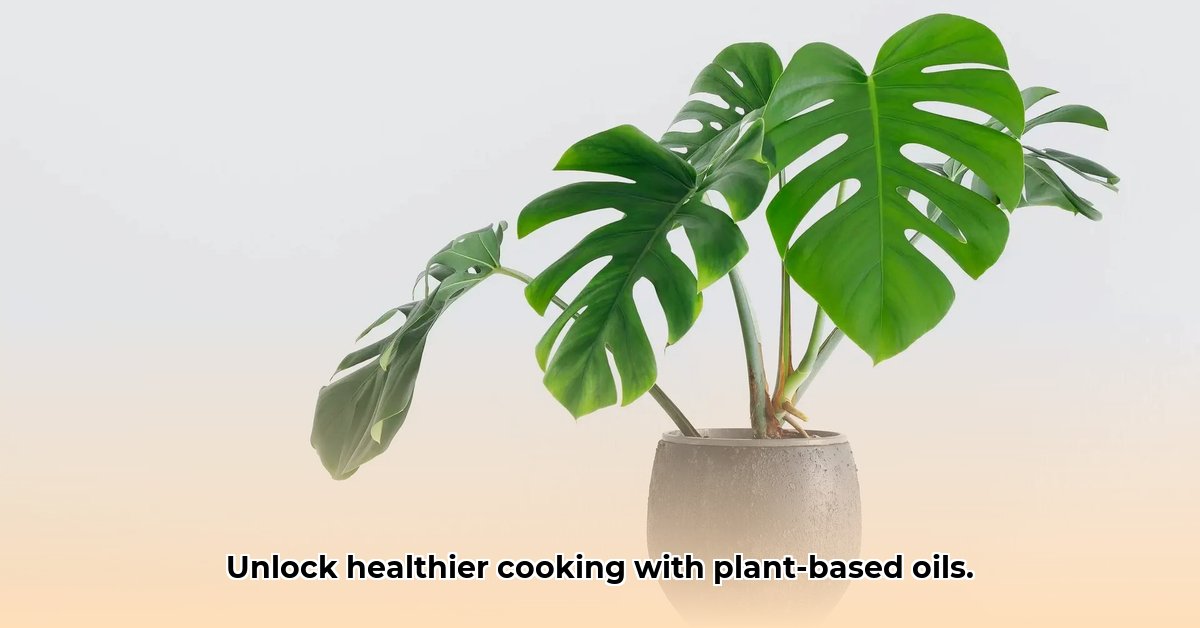Choosing the right cooking oil can be tricky, especially when you’re eating plant-based. There are tons of options out there, each with their own health benefits and environmental impact. This guide will help you sort through the confusion. We’ll break down things like smoke points and fatty acids in plain English, so you can understand what makes one oil better than another for your health and the planet. We’ll explore popular oils like olive, avocado, coconut, sesame, and more rating them on healthiness, versatility, and sustainability. By the end, you’ll be able to confidently choose oils that are good for you and good for the earth – making your plant-based cooking both delicious and responsible.
Understanding Plant-Based Cooking Oils
Choosing the right cooking oil is like selecting the perfect ingredient to elevate a dish. With so many options, each with unique strengths and weaknesses, understanding what makes an oil a good match for your cooking needs and health goals is essential. This guide aims to simplify things, helping you make smart, informed choices that are beneficial to your health and the planet.
Key Oil Properties: Smoke Points, Fatty Acids, and Flavor Profiles
Before reaching for that bottle of oil, it’s important to understand the key characteristics that set them apart. This includes understanding the smoke point (the temperature at which an oil starts to break down and smoke), fatty acid profiles (the types of fats the oil is composed of), flavor profiles (the distinct taste an oil imparts), and sustainability considerations (the oil’s environmental impact). Understanding these aspects enables informed choices about which oil to use for a particular cooking method or dish.
Let’s delve into these properties in more detail:
-
Smoke Point: The smoke point is the temperature at which an oil begins to break down and emit smoke. Exceeding this point not only affects the flavor of your food but can also release harmful compounds. Oils with higher smoke points are better suited for high-heat cooking methods like frying, searing and roasting, while those with lower smoke points are ideal for low-heat sautéing, baking, or using as finishing oils.
-
Fatty Acid Profiles: Oils are composed of different types of fats, each with its own health implications. The primary types are saturated, monounsaturated, and polyunsaturated fats. Monounsaturated and polyunsaturated fats are generally considered healthier than saturated fats. Polyunsaturated fats are further divided into omega-3 and omega-6 fatty acids, both essential for health but requiring a balanced intake.
-
Flavor Profiles: Each oil has a distinct flavor that can enhance or complement your dishes. Some oils, like extra virgin olive oil and sesame oil, have strong, characteristic flavors, while others, like avocado and canola oil, are more neutral. Consider the flavor profile of an oil in relation to the dish you’re preparing.
Environmental Impact: Choosing Sustainable Oils
The environmental footprint of cooking oil production is an important consideration. Factors to consider include land use, water consumption, pesticide application, processing methods, and transportation.
Here’s what to keep in mind:
-
Production Practices: Some oil crops, such as palm oil, have been linked to deforestation and habitat destruction. Opting for oils from crops grown with sustainable agricultural practices can significantly reduce your environmental impact.
-
Processing Methods: Minimally processed oils, like cold-pressed or expeller-pressed options, generally have a lower environmental impact than highly refined oils, as they require less energy and fewer chemicals to produce.
-
Certifications: Look for certifications like USDA Organic, Fair Trade, or Rainforest Alliance. These certifications indicate that the oil has been produced in an environmentally and socially responsible manner.
Plant-Based Oil Analysis: Making Informed Choices
Here is an overview of common plant-based cooking oils, highlighting their key characteristics and considerations:
| Oil Type | Smoke Point (°F) | Primary Fatty Acids | Flavor Profile | Sustainability Considerations | Cooking Applications | Potential Health Benefits/Risks |
|---|---|---|---|---|---|---|
| Avocado Oil | 520 | Monounsaturated | Neutral | High water usage, land conversion in some regions | High-heat cooking, sautéing, roasting, grilling, dressings | Rich in monounsaturated fats and vitamin E, may improve cholesterol levels |
| Extra Virgin Olive Oil | 375-405 | Monounsaturated | Fruity, peppery | Land use, potential pesticide use | Salad dressings, dipping, low-heat sautéing, finishing | High in monounsaturated fats and antioxidants, anti-inflammatory properties, may reduce heart disease risk |
| Coconut Oil | 350-450 | Saturated | Coconutty | Deforestation (if not sustainably sourced), high carbon footprint | Baking, sautéing, stir-frying (refined) | May raise LDL cholesterol levels, contains medium-chain triglycerides (MCTs) |
| Canola Oil | 400 | Monounsaturated, Polyunsaturated | Neutral | Pesticide use, genetically modified crops (GMOs) | High-heat cooking, baking, frying | Low in saturated fat, good source of omega-3 fatty acids, potential inflammatory effects if heavily processed |
| Sesame Oil | 410-450 | Polyunsaturated, Monounsaturated | Nutty, toasted | Varying sustainability practices | Stir-frying, sautéing, dressings, marinades | Rich in antioxidants sesamin and sesamolin, may lower blood pressure and cholesterol levels |
| Sunflower Oil | 450 | Polyunsaturated | Mild, neutral | High land and water use, potential for monoculture farming | High-heat cooking, frying, baking | High in vitamin E, may contribute to inflammation if consumed in excess |
| Grapeseed Oil | 420 | Polyunsaturated | Neutral | Byproduct of wine industry (can be considered sustainable) | High-heat cooking, sautéing, frying, dressings | High in vitamin E and linoleic acid, potential inflammatory effects if consumed in excess |
| Peanut Oil | 450 | Monounsaturated, Polyunsaturated | Mild, nutty | Intensive farming practices, potential for pesticide use | Deep frying, stir-frying, roasting | Good source of vitamin E, may contain allergens |
| Walnut Oil | 320 | Polyunsaturated | Rich, nutty | Limited sustainability data | Salad dressings, finishing, drizzling | Rich in omega-3 fatty acids (ALA), may improve heart health and brain function |
(Note: Smoke points and sustainability ratings are generalizations and can vary based on specific production methods and certifications.)
Practical Tips for Sustainable Plant-Based Oil Selection
- Match the Oil to the Cooking Method: Choose oils with high smoke points for high-heat cooking methods and oils with lower smoke points for low-heat applications or as finishing oils.
- Opt for Minimally Processed Oils: Select cold-pressed or expeller-pressed oils to retain more nutrients and minimize environmental impact.
- Look for Certifications: Prioritize oils with certifications like USDA Organic, Fair Trade, or Rainforest Alliance to support sustainable production practices.
- Reduce Oil Consumption: Many plant-based dishes can be prepared with little to no added oil. Experiment with alternative cooking methods like steaming, baking, or using vegetable broth for sautéing.
- Diversify Your Oil Choices: Instead of relying on a single type of oil, explore a variety of options to obtain a broader spectrum of nutrients and minimize your environmental impact.
Sustainable Plant-Based Oil Selection for High-Heat Cooking
Understanding Oil Properties: Smoke Points and Fatty Acids
Choosing the right oil for plant-based cooking isn’t just about flavor; it’s also about health and environmental impact. The key to understanding oils lies in two main properties: smoke point and fatty acid profiles. The smoke point is the temperature at which an oil starts to break down and smoke, producing harmful compounds. Selecting an oil with a high smoke point is essential for high-heat cooking methods like stir-frying, roasting, and deep-frying. Fatty acids are the building blocks of oils, categorized into saturated, monounsaturated (MUFAs), and polyunsaturated (PUFAs) fats. MUFAs, abundant in avocado and olive oil, are generally considered healthier, especially for high-heat cooking, as PUFAs are more prone to oxidation and the formation of harmful free radicals when heated.
Environmental Impact: A Sustainable Approach to Selecting Plant-Based Cooking Oils
The environmental impact of cooking oil production deserves attention. Avocado oil production, for example, can be water-intensive, while palm oil production is often linked to deforestation. Consider the entire lifecycle of an oil—farming, processing, and transportation—when making your choice. Look for oils with
- Why Am I Always Thinking About Food? Your Body and Brain Explain - February 2, 2026
- Healthy Eating Is About Quality, Not Just Calories - February 1, 2026
- Healthy Living Products to Elevate Your Wellness Routine - January 31, 2026










